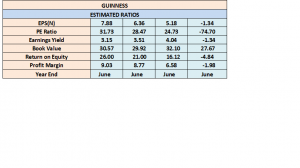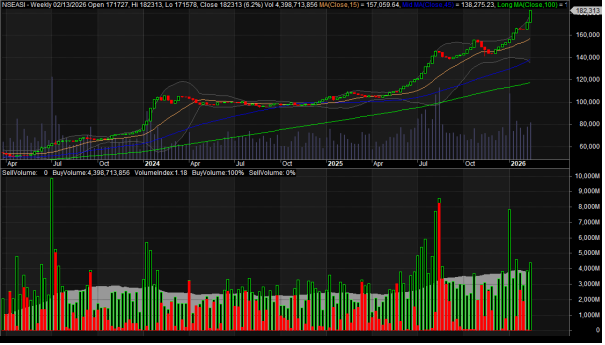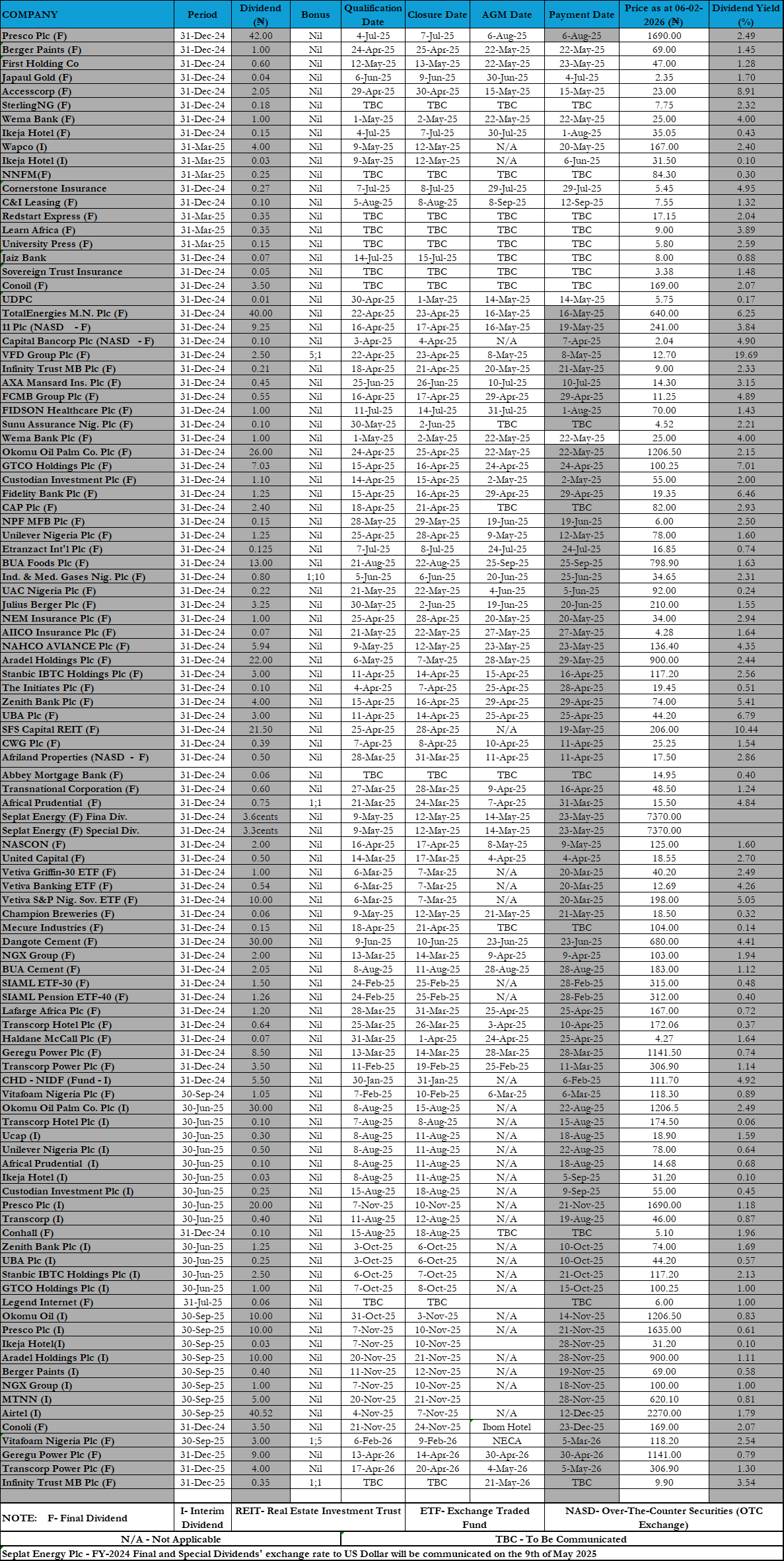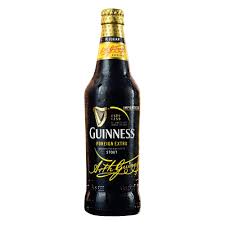
In this analysis, INVESTDATA NEWS’ Chief Research Officer, AMBROSE OMORDION, looks at the result of Guinness Nigeria Plc for the Q2 ended December 31, 2016, and submits that what was released earlier in the week is a trend that became noticeable six years ago in the form of declining profit margins and dividend payout, rather than just a sudden plunge into loss that can and should be blamed entirely on the Central Bank of Nigeria’s foreign exchange regime.
The half year scorecard of Guinness Nigeria Plc was on Thursday made available to the investing community, and the numbers were in deep red to making it the highpoint of the company’s six years dwindling profitability that was worsened by the FX scarcity in the country.
It is worth of note that the nation’s FX problem had adversely affected operators in the nation’s manufacturing and real sector significantly, following which most of them continue to post losses and declining earnings in the last 18 months.
The report, which came a day after its shareholders approved plans by the directors to source N40 billion fresh capital by way of right issue to be injected the company’s operations and to rescue the giant brewer from troubled waters arising from the harsh business environment worsened by the nation’s lingering economic recession.
It is evident that the management of Guinness Nigeria, is hiding under the current recession and FX policy of the Central Bank of Nigeria (CBN) that is not even up to one year, for it poor performance.
The investing public should be aware.
Just a cursory look at the company’s financial history, would have noticed long before now that Guinness Nigeria’s profitability ratios had particularly remained on the downward trend over the past five years, before finally turning full red for the first time in 30 years in the last full financial year ended June 30. 2016.
The trend has only continued in the current year with two quarters in loss.
The latest numbers reveal a mixed position when compared to the 2015 figures. Sales revenue for the period under consideration was up by 19% to N59.49 billion from N49.84 billion in 2015, but bottom-line turned red to a loss of N4.67 billion, from N1.17 billion profit, representing 499.15% drop. Also, Guinness Nigeria’s net assets for the period under review suffered 18.91% decline to N36.24 billion from N44.69 billion.
Its Loss per share (LPS) for the period stood at N3.10 as against Earnings Per Share (EPS) of N0.78 in the 2015, following which investors’ waiting period has turned negative to (-5.65x) from 35.33x, as a result of the loss. This was also despite the drop in its share price from N110 as at released date in 2016 to N70.05 when the current result hit the market. Earnings Yield also turned negative at 4.43% of the market price as at released date, as against the 0.71% yield estimated in 2015.
It is obvious that the saturated market and stiff competition in Nigeria’s brewery industry, coupled with the economic recession have complicated issues for Guinness Nigeria, whose top line and cost of sales were up, while cost of borrowing increased by 176.47% in the period under review. This was also in spite of the continued injection of funds by Diageo, its parent company, into Guinness Nigeria’s operations.
The trouble must have reached a head last year, following which Diageo, through its operating arm- Guinness Overseas, opted not to inject fund in its operation due to unimpressive performance and the challenging business environment in the country today. It preferred instead to bring the fund as equities. This may have resulted in the planned rights issue that could see its stake rise from the current 54% to anything around 70%, where the minority shareholders decline to fully take up their rights.
While it is true that foreign exchange rates have not helped matters, especially for companies that import raw materials, the need for companies operating in Nigeria today to undertake backward integration has more than ever before, become important as a cost cutting strategy to boost profit, with the corresponding value-chain effect.
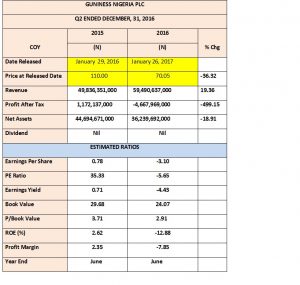
Source: NSE, Company Report & Investdata Research
The loss per share is a reflection of the high cost of financing its operation that was made worse by the CBN’s FX policy and cost of sales, following which management ought to have reacted by cutting costs aggressively. This is a pointer to the fact that possibility of paying dividend in 2017 is very slim, especially as the company’s loss position is increasing, while shareholders fund is dropping. Unless something drastic is done to arrest the situation, there may be no dividend at all.
The last funds injected into the company by the parent/core investor to mitigate the effect of the current FX problem on Guinness Nigeria has not reflected much on its operations, but if the proposed right issue goes well, it may help to resuscitate and put the company on the path of recovery. This is also expected to accelerate growth and return Guinness Nigeria to profit in the future.
Valuation/Recommendations
The company’s half year Book Value stands at N24.07, with a negative Price/Earnings ratio of 5.65x on the strength of its N3.10 loss per share. The company’s Loss Per Share is projected to continue.
On that note, investors with short and medium term investment goals should look away from this stock now and come back when its scorecard improves in the future. The shareholding structure of Guinness Nigeria may not allow it to have a free fall, but the stock’s price is projected to drop further.
We have revalued Guinness and downgraded it to a SELL for investors now and move to other stocks to play the earnings season.
Technical View
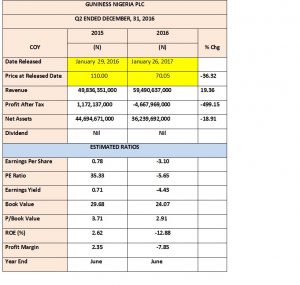
The stock on a monthly time frame has been trending down for more than four years since 2013, from the peak price of N297.50 per share to recently form a descending triangle chart pattern that indicates reversal or continuation of trend. The price action at the current strong support level that revealed double bottom at 2009 price of N63 looks like a reversal is imminent in the short term. Traders should watch for the first resistance at N89 and a pullback to strong support level of N62 as the market and analysts continue to interpret the numbers and the proposed right issue.
All considered, investors and traders should wait and watch
History
Guinness Nigeria, is a subsidiary of Diageo Plc of the UK. The first Guinness Stout was exported to Sierra Leone in 1827 and became popular across West Africa. In 1962, the Ikeja brewery was established in Lagos Nigeria, this became the group’s first location outside of the British Isles to brew the iconic dark beer. Three years later, in November 1965, Guinness Nigeria was listed on the floor of the then Lagos (now Nigerian) Stock Exchange. This company brews beer, packages and markets beverages such as Guinness Stout, Malta Guinness, Harp larger, Gordon’s Spark and other new products that were introduced into the market recently. Also the company has expanded its production capacity by building Benin and Ogba (Ikeja, Lagos) plants to meet demand.
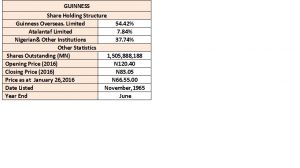
Earnings Performance
Guinness’ dwindling performance for the past four years has reflected on its profitability level and the dividend of N0.50 paid for the financial year ended June 30, 2016. The company’s sales revenue is still mixed, while major cost lines have continued to rise generally ahead of income. Its share price lost tempo through the period under consideration to adjust to the numbers being posted on quarterly and yearly basis in the comparable period of 2016.
It may be slightly difficult to place a fair value on Guinness such as will match the current market price, except one can actually value investor confidence and sentiments for the equity’s price to retain strength. Nevertheless, assuming such could be valued along with other ratios such as the Loss Per Share, dividend payout ratio and Book Value, it will be appropriate to place the equity at an intrinsic value of N48 each to reflect the recent numbers posted for 2016.
Over the past four years specifically, Guinness Nigeria’s turnover dropped by 22.40% to N101.97 billion and profit after tax from N11.86 billion in 2011 to a red position of N2.02 billion, representing 119.03% drop.
The company’s profit level has been going down since 2011 and at the beginning of the financial year of 2016. In the same vein, its dividend payout dropped by 92.86% from N7.00 in 2013 to N0.50, an indication of the weak earnings power of the company that may lead to investors dumping it’s shares for others. But the current shareholding company’s structure and float have supported its share price thus far, keeping it high and not allowing it to embark on a free fall.
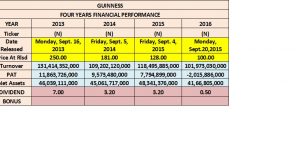
Profitability Ratios
The company’s weak earning power has finally given way to a loss and the subsequent loss per share of N1.34 from an EPS of N7.88 in 2013. The said loss could account for negative 74.70x of the price at 2016 release date, increasing waiting period to recoup their investment from 31.73xs in 2013, besides the estimated negative yield of 1.34% of the price.
Please note that the fluctuations recorded year-on-year in P/E Ratio and Earnings Yield in the table below was due to decline in earnings and the unstable price movement. Estimated Ratios shows that the Book Value has been unstable in the last four years from N30.57 in 2013 to N27.67 in 2016. Also, profit margin has dropped significantly due to increasing cost of operations from 9.03% in 2013 to -1.98% in 2016. Return On Equity to investors have for four years constantly dropped to a negative 4.84% from 26% in 2013.
